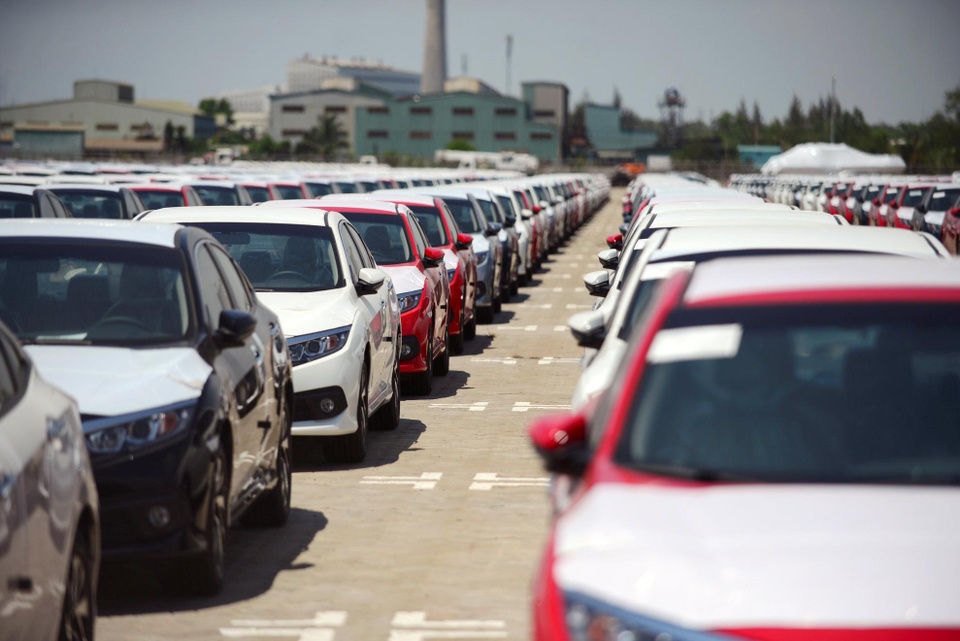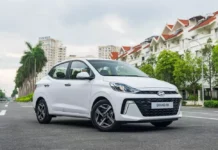
|
The latest report from the General Statistics Office of Vietnam indicates that in June, the country imported an estimated 16,000 completely built-up (CBU) automobiles, with a trade value of approximately 307 million USD. Cumulatively, from the beginning of the year, the import volume of CBU automobiles into Vietnam is estimated at 74,716 units, with a total trade value of nearly 1.547 billion USD.
Growing Popularity of Imported Vehicles
According to data from the General Statistics Office, compared to the first half of last year, the import volume of CBU automobiles in Vietnam increased by 5.3%, while the trade value decreased by nearly 7%.
As per the report from the General Department of Vietnam Customs, as of the end of May, Indonesia and Thailand remain the top two countries supplying imported automobiles to the Vietnamese market. Specifically, a total of 26,233 CBU automobiles were shipped from Indonesia to Vietnam in the first five months, with a trade value of over 380 million USD.
During the same period, Thailand exported 18,495 CBU automobiles to Vietnam, with a total trade value of more than 357 million USD. The report also shows that 11,869 CBU automobiles of Chinese origin were imported into Vietnam in the first five months, with a trade value of approximately 373 million USD.
|
|
|
Indonesia is the top supplier of imported automobiles to the Vietnamese market. Photo: Dan Thanh |
The recent increase in the import volume of CBU automobiles is likely influenced by the strong demand for these vehicles in the Vietnamese market. According to the report published by the Vietnam Automobile Manufacturers’ Association (VAMA), May was the second consecutive month where the sales volume of imported automobiles outperformed that of domestically assembled vehicles.
Moreover, the gap in sales volume between imported and assembled cars widened from 384 units in April to 1,824 units in May. This is also only the second time in the last four years that the Vietnamese market has witnessed a tilt in the sales balance towards imported cars for two consecutive reporting periods.
Currently, the top-selling models in the Vietnamese automobile market include many imported names. The most notable example is the Mitsubishi Xpander, with 5,936 units imported from Indonesia out of a total sales volume of 6,537 units in the first five months of the year.
Additionally, the top 10 best-selling cars in Vietnam for the first five months of the year also include fully imported models such as the Ford Everest (3,612 units), Mitsubishi Xforce (2,942 units), and Toyota Yaris Cross (2,939 units).
The significant appeal of imported cars in the Vietnamese automobile market is causing a noticeable shift in the sales balance compared to domestically assembled cars. In fact, the changing preferences of Vietnamese consumers seem to be impacting the production volume of local automobiles.
Decline in Domestic Automobile Production
According to the report from the General Statistics Office, an estimated 27,200 automobiles of all kinds were produced and assembled domestically in June. This represents a decrease of more than 6% compared to the same period last year.
Cumulatively, from the beginning of the year, an estimated 144,000 domestically produced automobiles have rolled out of local factories. This puts the local automobile production volume for the first two quarters of this year at about 3% lower than the figures recorded in the same period of 2023.
As mentioned earlier, domestically assembled cars are currently lagging in the Vietnamese automobile market, with their sales volume surpassed by imported cars for two consecutive reporting periods. Popular domestically assembled models such as the Toyota Vios, Hyundai Accent, and Mazda CX-5 are struggling to find a strong position in the sales ranking.
|
|
|
The Hyundai Accent has almost fallen out of the race for the best-selling car in the Vietnamese market in 2024. Photo: TC Motor |
As of the end of May, the cumulative sales volume of domestically assembled cars stood at 54,887 units, while the sales volume of imported cars for the same period was 53,422 units. The sales gap is quite narrow, and if the import segment continues its current growth trajectory, domestically assembled cars may officially fall behind in the Vietnamese market when the June report is released.
The Vietnamese automobile market is currently awaiting the next round of registration fee reductions for domestically assembled cars, expected to take effect in August and last until the end of the first month of 2025. This is seen as an opportunity to stimulate market demand and help boost the sales volume of locally produced cars amid the relatively strong performance of imported models.
Recommended Books for Your Car Journey
The ‘Xe’ section recommends fascinating books with a variety of engaging topics. During those moments of rest and relaxation on your journeys, books can be delightful companions.
2023: A Test of Integrity and Reputation for the Japanese Automotive Industry
In 2023, despite facing a dual challenge of an economic crisis and the unexpected disruptions caused by Daihatsu, Toyota Vietnam has managed to maintain its position as the leading brand in the passenger car market. Through responsibility and perseverance, the Japanese car manufacturer has successfully overcome these difficulties. Most recently, Toyota has announced the delivery of the Avanza Premio MT to its dealerships starting from January 26th, providing an official response for this model in Vietnam.












































